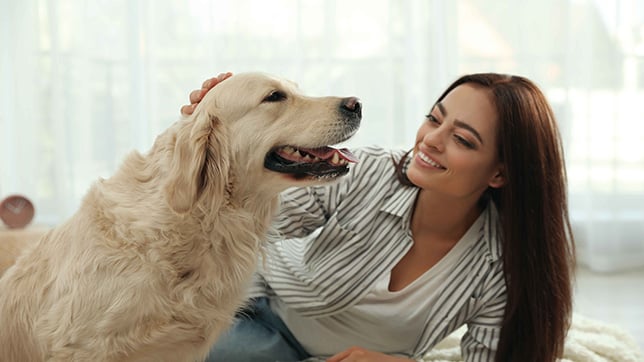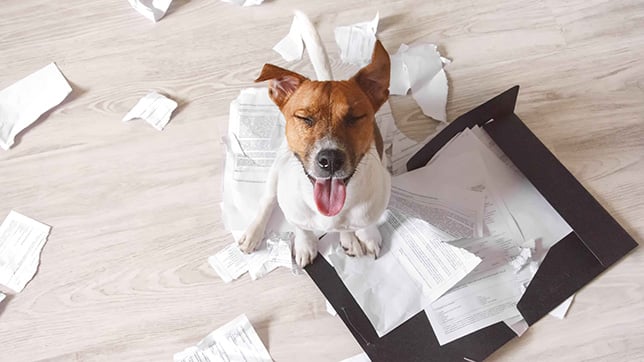How to settle a rescue dog into your home
The decision to adopt a rescue dog, rather than buy a puppy from a breeder, can be incredibly rewarding. The knowledge that you’re giving a dog, who has perhaps had a difficult past, a second chance at a forever home is extremely enriching.
Once used to their new, loving surroundings, the bond that forms between a rescue dog and their new family is unlike any other.
However, due to their often-unsettled background or previous negative experiences, a dog you’ve adopted from an animal rescue shelter may take a little longer to settle into your family.
To make the process easier, we’re sharing some top tips on caring for a rescue dog, so your new furry friend feels happy and comfortable in their forever home…
Set aside enough time
A dog who has recently been adopted may have come directly from a shelter and might not have experienced a typical home setting for a while, if ever. For this reason, your new dog could easily become anxious or act unusually when they first join your family.
It can take a few weeks, or even months, for a rescued dog to adjust properly to their new family and surroundings. However, if you provide them with the love and attention they need, your canine companion should eventually feel right at home.
Be prepared
Making sure you’re prepared, by having everything you need, can help your dog to feel comfortable and content as they get used to their new forever home.
Being prepared also means you won’t have to head out on any last-minute trips to the pet shop to stock up on supplies!
Neutral introductions
If you have existing pets, introducing them to your dog takes careful consideration and prior planning. For example, should you have a dog already, try to introduce the two in a neutral place, like a park or garden, rather than in your home.
Introducing your new canine companion to an existing cat shouldn’t be rushed either, as forcing them to interact when they’re not quite ready could cause stress to everyone involved.
You’ll want to keep your pets’ first introductions as calm as possible, while providing a safe space for both to retreat to if needed.
Don’t leave them alone for too long
To earn their trust and reassure them that they’re in a safe, loving environment, it’s best to set a few days aside to spend time with your new pet.
Spending quality time with your new dog, can help make their transition easier and ensure they don’t encounter any issues, such as separation anxiety.
During the first few days after bringing your pet home, try not to leave them alone for more than a few hours at a time. This should help to avoid separation anxiety, as you work together to establish a routine that works best for you both, aiding the settling in process.
Be patient
A rescued dog’s behaviour may not be what you expect straight away.
As a result of potential mistreatment in the past, a rescued dog may act aggressively around food or become protective over things they might see as ‘theirs’.
Understandably, your new canine companion will likely need lots of time to adjust to their new environment and family.

So, patience and a watchful eye are important qualities to have when welcoming an adopted dog into your home.
Losing your temper by snapping or punishing your pet will exacerbate negative behaviour or cause fear and anxiety, which could lead to further problems. It’s crucial that you remain patient and use positive reinforcement to train your new pet, by rewarding good behaviour.
Housetraining
There’s a possibility that your rescued dog has already received house training. However, some dogs will have been taken in by a rehoming shelter before house training was possible.
Even if your new dog has been house trained, it’s useful to get some puppy pads and spare bedding, to keep your house clean while establishing a routine.
Establishing a regular schedule for feeding and toilet time will support them to become house-trained, while allowing them to settle into your lifestyle.

Give them their own space
Giving your dog a space that belongs solely to them provides somewhere they can retreat to if they feel overwhelmed or scared.
Their safe space should be clean, confined, and comfortable – like a crate in the corner of a quieter room, or a bed under the stairs.
If you notice that your dog prefers to sleep in a specific area of the house, then try moving their crate or bed there.
The 3-3-3 rule
The 3-3-3 rule or ‘Rule of Threes’ represents the phases or common milestones your new dog or puppy will go through as they get used to their new home.
Using the 3-3-3 rule, you and your dog can work together through any unwanted behaviour and allow enough time for you both to bond.
The first 3 days
It’s likely that your dog finds the change in their surroundings overwhelming, especially if they spent a long period of time at the rescue centre, waiting for their forever home.
Now they’ve found a forever home with you, it can take some time to get used to that change.
No matter how much you plan ahead, you won't know how your newly adopted pet is going to react in their new environment until they’re home. So, don’t be alarmed if they’re not quite the dog you met and fell in love with for the first few days following their arrival.
After 3 weeks
After the first three weeks, your dog might be feeling more comfortable in their new home as they get used to the routine you’ve set. You should start seeing their true personality as they play with toys, look for cuddles, and find their favourite spots around the house.
Behaviour issues may arise as your dog tests boundaries; so, it’s important to be consistent in your training to make sure they understand what they can and cannot do.
After 3 months
Three months after they join your family, your dog should feel comfortable and secure at home – having developed a bond, through love and trust, with you and your household.
Training is still key to their comfort though, so don’t stop working with them and remember to ease your dog into any changes to their routine.
Each situation is different, and every dog’s experience will be unique. So, it’s essential to be patient as they get used to their new surroundings and adjust to your family’s routines.
If you have any concerns about your new canine companion, speak to staff at the rescue centre or contact a vet for advice.
Don’t forget! The vet experts at Joii Pet Care are available to help at any time, from anywhere, should you need advice or support about caring for your new dog.
Looking for more dog advice?
Find the information you need as we support you through every step of your journey with your canine companion.
Need dog insurance?
Dog insurance can help cover the cost of veterinary treatment if your dog gets injured or falls ill.
We know pets
Our pets are part of the family. To achieve our vision of a better future for pets everywhere, we work with our partners, vets, and other veterinary professionals who are pioneering the latest advancements in animal care. Our campaigns, articles, and events are crafted to support, educate, and celebrate pet owners, while our policies are designed to provide peace of mind at an affordable price.
Yet our policies don’t just protect against the unexpected – they have purpose, too.
Since we were founded over 25 years ago, we've provided industry-leading policies that protect the nation’s pets, while also making a difference to animal welfare and our planet. Thanks to you, our policyholders, we've donated over £9 million to more than 830 animal welfare charities and conservancies, helping to support vulnerable pets and wildlife around the world.
We’re proud to be wildly different. Are you?
